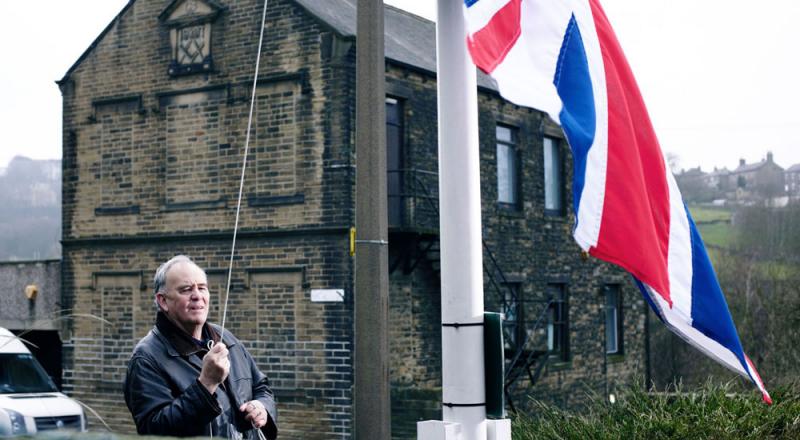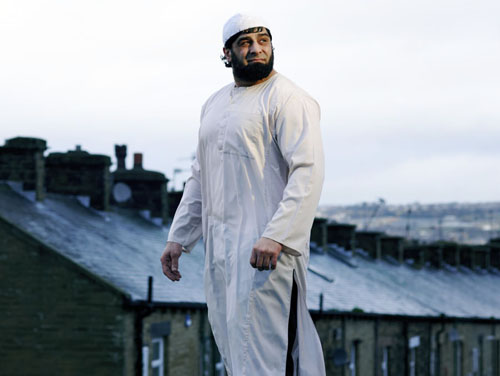Make Bradford British, Channel 4 | reviews, news & interviews
Make Bradford British, Channel 4
Make Bradford British, Channel 4
Is this experiment in multiracial integration just a TV gimmick?

It's a quintessential Channel 4 idea. Take one hot-button issue (racial integration, or lack of it), go to Bradford ("one of Britain's most segregated cities," according to the voiceover), and shove a racially mixed bunch of locals into a thinly-disguised Big Brother house to see how they'll get along. To stir the pot a bit more, the eight chosen "contestants" all failed the government's UK Citizenship test.
Not that that singles them out, particularly. The programme-makers staged test-sittings all around Bradford, from the Asian-dominated city centre or Manningham to predominantly white areas such as Haworth and Idle, and the lowest - that's lowest - recorded failure rate was Haworth's 85 per cent (it was total 100 per cent fail in the city centre).
 So if hardly anybody can pass the Britishness test on paper, could our participants do any better in person? Would they indeed prove to be "a blueprint for multicultural Britain"? They certainly appeared to have been selected with a Simon Cowell-like eye for maximum interpersonal combustibility, and it gave one no confidence whatsoever to be told that this entire experiment was being run under the guidance of "diversity and community experts" Taiba Yasseen and Laurie Trott. It sounded like a blueprint for sociological jargon and posturing, and a cynical person might wonder whether diplomas in diversity and community expertise are to be found in boxes labelled "please take one".
So if hardly anybody can pass the Britishness test on paper, could our participants do any better in person? Would they indeed prove to be "a blueprint for multicultural Britain"? They certainly appeared to have been selected with a Simon Cowell-like eye for maximum interpersonal combustibility, and it gave one no confidence whatsoever to be told that this entire experiment was being run under the guidance of "diversity and community experts" Taiba Yasseen and Laurie Trott. It sounded like a blueprint for sociological jargon and posturing, and a cynical person might wonder whether diplomas in diversity and community expertise are to be found in boxes labelled "please take one".
Anyway, back at the British Bradford house, there was Audrey, black landlady of a city centre pub who wasn't afraid to admit that she doesn't like the way she's often treated by "Pakis". Jens is a 71-year-old retired policeman who cheerfully addressed Desmond as "you black bastard", but of course only in a humorous way. Desmond, who had suffered prejudice on the mostly-white Holmewood estate, tried gamely to raise a laugh, but he wasn't happy.
Jens also upset young Asian woman Sabbiyah (pictured above) by recalling his golden years pounding the beat in Bradford with his Asian partner, whom he would jovially invite to come "Paki-bashing" with him. How they laughed! (allegedly). Sabbiyah, however, was horrified, because "Paki-bashing" reminded her of the struggles her parents faced when trying to adjust to British life. Jens seemed to think that using expressions like these proved that he wasn't really a racist, and he wished that people "would get a sense of humour." One like his own, perhaps.
From the liberal elite, we had 66-year-old Maura (pictured below), a former magistrate who has lived for 40 years in well-heeled Ilkley. Maura told us she has read a lot of books about other cultures. She's also a drama queen, and prone to high-minded speechifying. "One of the most important values Britain has to give the world is tolerance," she orated, "and I think we should be intolerant of intolerance."
 When the housemates sat down to their inaugural dinner, after a certain amount of haggling over how much of the collective budget should be spent on alcohol which the Muslim contingent obviously wouldn't be drinking, Maura raised a toast to "differences, yet togetherness." She even had a little set-piece prepared about racism, as if it were something she was carrying around on Oscar night ("I really cannot think why any intelligent rational person can be a racist!" etc).
When the housemates sat down to their inaugural dinner, after a certain amount of haggling over how much of the collective budget should be spent on alcohol which the Muslim contingent obviously wouldn't be drinking, Maura raised a toast to "differences, yet togetherness." She even had a little set-piece prepared about racism, as if it were something she was carrying around on Oscar night ("I really cannot think why any intelligent rational person can be a racist!" etc).
But the producers had built in a cunning if unsubtle paradox, whereby the candidate seemingly least willing to compromise his beliefs or way of life in the interests of integration eventually proved to be an agent of tolerance. This was Rashid, a 37-year-old former rugby league player who insisted on travelling to the mosque five times a day to pray with fellow believers ("I'm not going to a miss a prayer for nobody"). This meant that he was effectively unable to participate in any of the organised group activities. Eventually he was prevailed upon to go on a bus trip to a stately home and pray on the hoof, as it were, rolling out his prayer mat on the grass while Jens helped him to locate the direction of Mecca.
 Rashid (pictured right) repaid the favour by soothing ruffled feathers after Jens's blundering comments had caused simmering discord. "We're all humans, we all make mistakes, we've all got weaknesses," he told Jens kindly. Jens looked flabbergasted.
Rashid (pictured right) repaid the favour by soothing ruffled feathers after Jens's blundering comments had caused simmering discord. "We're all humans, we all make mistakes, we've all got weaknesses," he told Jens kindly. Jens looked flabbergasted.
Amazingly, even the sociologists managed to dig out a grain of sense. As Ms Yasseen pointed out, in matters of racial integration, we get a lot of lectures from politicians and "intellectuals" (who usually don't have to live with the consequences), "but we've never really heard what do the people think?... In communities you've got to start with people." Spot on, ma'am. Part two next week, in which our participants swap roles.
Explore topics
Share this article
Add comment
The future of Arts Journalism
You can stop theartsdesk.com closing!
We urgently need financing to survive. Our fundraising drive has thus far raised £49,000 but we need to reach £100,000 or we will be forced to close. Please contribute here: https://gofund.me/c3f6033d
And if you can forward this information to anyone who might assist, we’d be grateful.

Subscribe to theartsdesk.com
Thank you for continuing to read our work on theartsdesk.com. For unlimited access to every article in its entirety, including our archive of more than 15,000 pieces, we're asking for £5 per month or £40 per year. We feel it's a very good deal, and hope you do too.
To take a subscription now simply click here.
And if you're looking for that extra gift for a friend or family member, why not treat them to a theartsdesk.com gift subscription?
more TV
 theartsdesk Q&A: director Stefano Sollima on the relevance of true crime story 'The Monster of Florence'
The director of hit TV series 'Gomorrah' examines another dark dimension of Italian culture
theartsdesk Q&A: director Stefano Sollima on the relevance of true crime story 'The Monster of Florence'
The director of hit TV series 'Gomorrah' examines another dark dimension of Italian culture
 The Monster of Florence, Netflix review - dramatisation of notorious Italian serial killer mystery
Director Stefano Sollima's four-parter makes gruelling viewing
The Monster of Florence, Netflix review - dramatisation of notorious Italian serial killer mystery
Director Stefano Sollima's four-parter makes gruelling viewing
 The Diplomat, Season 3, Netflix review - Ambassador Kate Wyler becomes America's Second Lady
Soapy transatlantic political drama keeps the Special Relationship alive
The Diplomat, Season 3, Netflix review - Ambassador Kate Wyler becomes America's Second Lady
Soapy transatlantic political drama keeps the Special Relationship alive
 The Perfect Neighbor, Netflix review - Florida found-footage documentary is a harrowing watch
Sundance winner chronicles a death that should have been prevented
The Perfect Neighbor, Netflix review - Florida found-footage documentary is a harrowing watch
Sundance winner chronicles a death that should have been prevented
 Murder Before Evensong, Acorn TV review - death comes to the picturesque village of Champton
The Rev Richard Coles's sleuthing cleric hits the screen
Murder Before Evensong, Acorn TV review - death comes to the picturesque village of Champton
The Rev Richard Coles's sleuthing cleric hits the screen
 Black Rabbit, Netflix review - grime and punishment in New York City
Jude Law and Jason Bateman tread the thin line between love and hate
Black Rabbit, Netflix review - grime and punishment in New York City
Jude Law and Jason Bateman tread the thin line between love and hate
 The Hack, ITV review - plodding anatomy of twin UK scandals
Jack Thorne's skill can't disguise the bagginess of his double-headed material
The Hack, ITV review - plodding anatomy of twin UK scandals
Jack Thorne's skill can't disguise the bagginess of his double-headed material
 Slow Horses, Series 5, Apple TV+ review - terror, trauma and impeccable comic timing
Jackson Lamb's band of MI5 misfits continues to fascinate and amuse
Slow Horses, Series 5, Apple TV+ review - terror, trauma and impeccable comic timing
Jackson Lamb's band of MI5 misfits continues to fascinate and amuse
 Coldwater, ITV1 review - horror and black comedy in the Highlands
Superb cast lights up David Ireland's cunning thriller
Coldwater, ITV1 review - horror and black comedy in the Highlands
Superb cast lights up David Ireland's cunning thriller
 Blu-ray: The Sweeney - Series One
Influential and entertaining 1970s police drama, handsomely restored
Blu-ray: The Sweeney - Series One
Influential and entertaining 1970s police drama, handsomely restored
 I Fought the Law, ITVX review - how an 800-year-old law was challenged and changed
Sheridan Smith's raw performance dominates ITV's new docudrama about injustice
I Fought the Law, ITVX review - how an 800-year-old law was challenged and changed
Sheridan Smith's raw performance dominates ITV's new docudrama about injustice
 The Paper, Sky Max review - a spinoff of the US Office worth waiting 20 years for
Perfectly judged recycling of the original's key elements, with a star turn at its heart
The Paper, Sky Max review - a spinoff of the US Office worth waiting 20 years for
Perfectly judged recycling of the original's key elements, with a star turn at its heart

Comments
We had to turn this programme
I just failed the test. I am